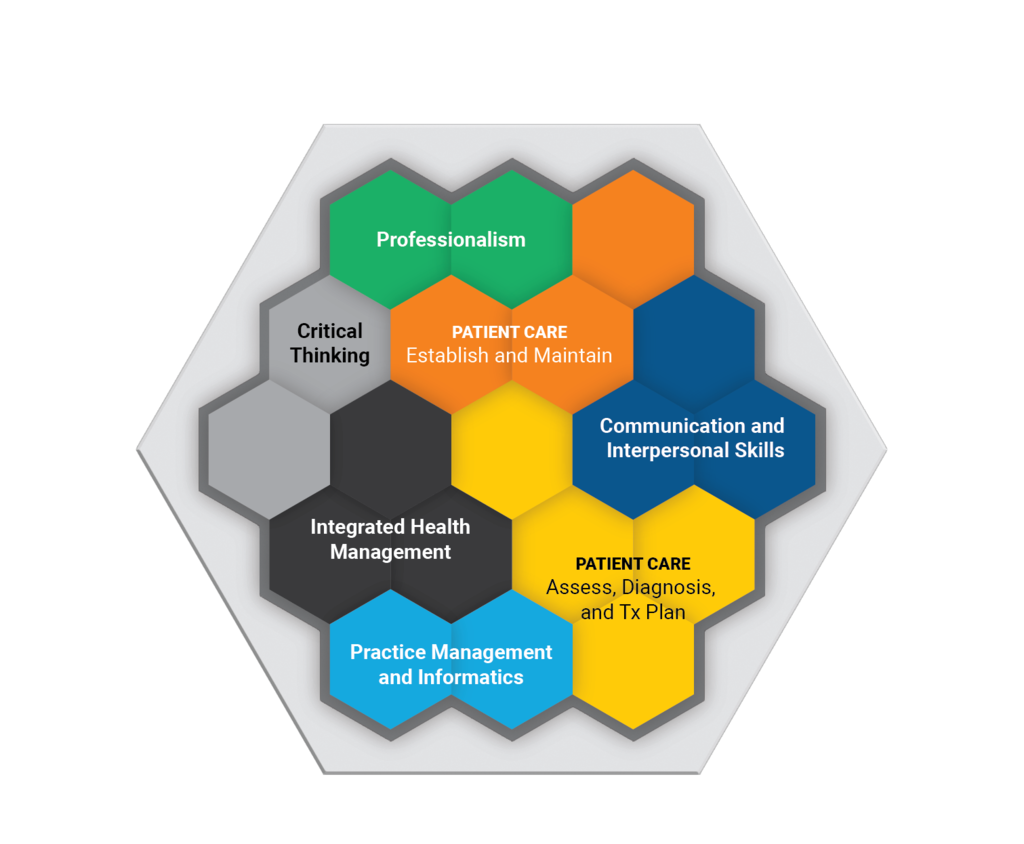
|
2.1 |
Apply ethical principles and legal standards in the provision of dental care. |
2.2 |
Practice within the scope of optimal standard of care and consult/refer to professional colleagues when indicated. |
2.3 |
Demonstrate professional characteristics of honesty, respect, resiliency, self-awareness, and responsibility. |
2.4 |
Effectively and professionally provide, elicit, and respond to feedback. |
3.1 |
Exhibit appropriate interpersonal and communication skills with individuals from diverse backgrounds. |
3.2 |
Demonstrate effective collaboration skills with the patient care team. |
3.3 |
Utilize appropriate strategies when faced with difficult situations |
4.1 |
Provide appropriate oral health prevention, intervention, and educational strategies to patients. |
4.2 |
Actively engage with dental team members and other healthcare professionals in providing comprehensive care management. |
4.3 |
Contribute to the improvement of oral health beyond those served in traditional practice settings and with limited access to care. |
4.4 |
Provide culturally responsive, person-centered care by integrating social determinants of health into overall patient wellness. |
5.1 |
Evaluate and apply contemporary and emerging information including clinical and practice management technology resources including teledentistry. |
5.2 |
Apply principles of risk management including informed consent and appropriate record keeping in patient care. |
5.3 |
Recognize effective business, financial management, and human resource skills. |
5.4 |
Apply quality assurance, assessment and improvement concepts into clinical care and practice. |
5.5 |
Comply with local, state, and federal regulations and guidelines including CDC, OSHA and HIPAA. |
5.6 |
Demonstrate effective management skills including preparedness for patient visits and organization within the patient visit to enhance efficiency and outcome. |
5.7 |
Develop a crisis preparedness plan for the dental practice. |
6.1 |
Manage the oral health care of the infant, child, adolescent, and adult as well as the unique needs of geriatric and special needs patients. |
6.2 |
Prevent, diagnose, and manage trauma, oral diseases and other disorders. |
6.3 |
Select, obtain, interpret and integrate patient/medical data, including a thorough intra/extra oral examination, and use these findings to accurately assess and manage all patients. |
6.4 |
Know the indications, select, obtain, interpret and document diagnostic images for the individual patient. |
6.5 |
Recognize the manifestations of systemic disease and how the disease and its management may affect the delivery of dental care and vice versa. |
6.6 |
Formulate a comprehensive diagnosis, treatment, and/or referral plan for the management of patients. |
6.7 |
Utilize universal infection control guidelines for all clinical procedures. |
6.8 |
Prevent, diagnose, and manage pain and anxiety in the dental patient. |
6.9 |
Prevent, diagnose, and manage temporomandibular disorders. |
6.10 |
Prevent, diagnose, and manage diseases of the periodontium. |
6.11 |
Prevent, diagnose, and manage caries disease. |
6.12 |
Manage restorative procedures that preserve tooth structure, replace missing or defective tooth structure, maintain function, are esthetic, and promote soft and hard tissue health. |
6.13 |
Diagnose and manage developmental or acquired occlusal abnormalities. |
6.14 |
Manage the replacement of teeth for the partially or completely edentulous patient. |
6.15 |
Prevent, diagnose, identify and manage pulpal and periradicular diseases. |
6.16 |
Diagnose and manage oral surgical treatment needs. |
6.17 |
Prevent, recognize, and manage medical and dental emergencies. |
6.18 |
Recognize and manage patient abuse and/or neglect. |
6.19 |
Recognize and manage substance abuse. |
6.20 |
Evaluate outcomes of comprehensive dental care. |
6.21 |
Diagnose, identify, and manage oral mucosal and osseous diseases. |